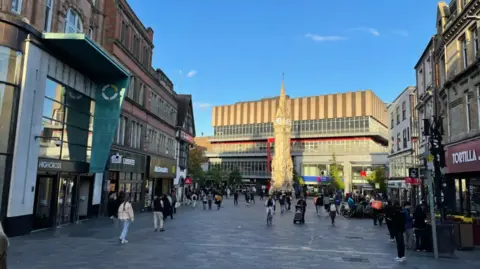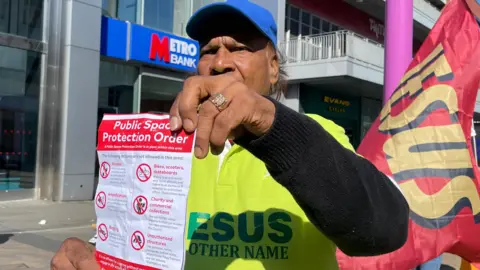Protesters seek protection from anti-social order
 BBC
BBCCampaign groups have joined forces to write a letter to Leicester's city mayor seeking assurances they are exempt from a new anti-social behaviour order.
The city council put a new public spaces protection order (PSPO) in place from April to tackle issues including e-scooters, drinking, playing loud music and begging.
However the groups, which include unions, political parties and other campaigners, fear the order could "constitute an unjustified limit on their democratic rights" as the ban also includes "unauthorised structures" such as banners, stalls and tables.
Leicester City Council said there were processes in place to allow freedom of speech, which remain unchanged under the new rules.
The order, which is valid for three years, covers the city centre inside the ring road and includes Leicester railway station, all of New Walk and the area between London Road and Regent Road as far as Granville Road.
It has given police and council officers greater powers to take enforcement action against anyone deemed to be causing a nuisance in the area.
The new rules also aim to clamp down on anyone who is either caught collecting for charity or who puts up a gazebo without prior permission from the city council.
It was introduced after more than 1,000 residents responded to a consultation, with nine of out 10 people supporting the action to address unlicensed amplification and loudspeakers.
As of May, an individual breaching the order could be given a £100 on the spot fine, and the fixed penalty notice could rise to £1,000 if a prosecution results in a conviction.

In the letter to Sir Peter Soulsby, the former city mayoral and socialist candidate, Steve Score, said on behalf of the organisations that many groups had regularly campaigned on Saturdays and at other times for decades and had "never been anti-social".
"To prohibit these groups from peacefully, and without causing a public nuisance, carrying out their regular campaigning would constitute an unjustified limit on their democratic rights to free speech," he wrote.
"We are sure that you did not intend the PSPO to be used in this way, so we are seeking assurances that trade unions, campaign groups, political parties and others will be exempt from this PSPO."
Last month, religious groups received warning notices for the way they promote their faith to shoppers.
They told the BBC they were handed warnings for using loudspeakers and setting up street stalls and banners near the Clock Tower.
Members of the groups said they felt they had been unfairly targeted as a public nuisance for exercising their right to religious free speech.
In response, Sir Peter said the order did not ban religious groups from the city centre but aimed to deter them from "unnecessary and intensely irritating behaviour".
In a statement the city council added: "The PSPO does not restrict freedom of speech but it does restrict the nuisance of amplifiers, gazebos and other structures that more than 1,100 respondents to our consultation told us negatively impacted their experience of Leicester city centre.
"Many groups have been respectful of this so far and, as a result, the environment in the city centre is noticeably improved.
"There are clear processes already in place to ensure that the right to protest can be freely exercised, which remain unchanged under the new arrangements."
Follow BBC Leicester on Facebook, on X, or on Instagram. Send your story ideas to [email protected] or via WhatsApp on 0808 100 2210.
